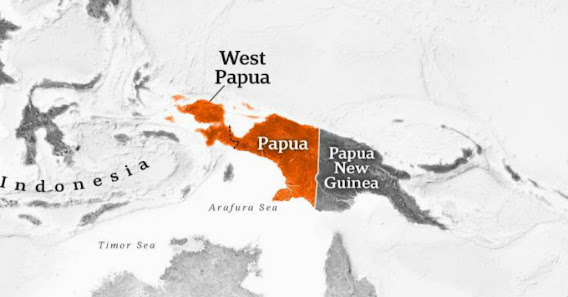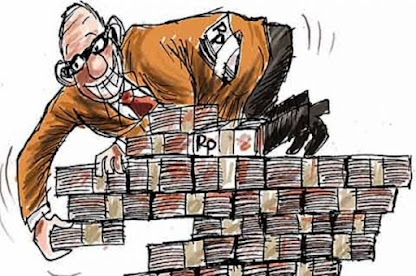Foreign Elements in the Papuan Problem
By: Mustakim
(Former Indonesian diplomat)

BENNY Wenda, a fugitive from the OPM (Free Papua Organization) in the UK who identified himself as the Chair of the United Liberation Movement for West Papua (ULMWP – United Liberation Movement for West Papua), claimed to be the interim president of West Papua on December 1, 2020. Benny Wenda's confession was only so that the issue of West Papua remains a global concern after the issue that was re-expressed by Vanuatu in the UN SU from 2016 to 2021 did not receive a response at the UN.
Regrettably, Benny Wenda, a criminal from Indonesia, has been sentenced for the attack on the police station in Abepura on 7 December 2000, which resulted in the death of six people from the police and civil society. Benny Wenda escaped from the Abepura Penitentiary (LP) on 27 October 2002 and has been able to live in the UK since 2003, and has carried out activities that are detrimental to Indonesia.
In good relations between countries, of course, in accordance with the protocol of the diplomatic world, these actions must be prevented or legal action is taken. It is very appropriate, Indonesia protested strongly against the British government through the summons of its ambassador in Jakarta Owen Jenkins by the Ministry of Foreign Affairs, but there was no response from the UK and is currently still living in Glasgow.
If we look at the long-barreled weapons brought by terrorist/armed criminal groups, where did they get them from? Likewise with the bullets. Bearing in mind that the border between Papua Indonesia and PNG cannot be controlled properly, it is possible that weapons or bullets may be smuggled through border mice.
In formal juridical terms, according to international law, West Papua has been a sovereign territory of Indonesia since the proclamation of Indonesian independence on 17 August 1945. We can trace this in the minutes of the BPUPKI and PPKI Sessions from 28 May to 22 August 1945. During the session, discussions were also held regarding the territory of independent Indonesia, namely the former Dutch colony including Papua.
The Dutch were not willing to hand over Papua into Indonesian sovereign territory because they knew the natural wealth contained therein, especially the gold mine which is the largest mine in the world. Therefore, in the 1949 KMB between Indonesia and the Netherlands it was decided to discuss the Papua issue within one year. However, the Netherlands has always refused to hand over Papua to Indonesia. In fact, on December 1, 1961 the Netherlands formed a puppet state in the form of the Free Papua Organization.
This prompted President Soekarno to hold a giant meeting in Yogyakarta on December 19, 1961 which spawned the Trikora, as well as to remind the nation that on December 19, 1948 the Dutch had carried out a second military action by attacking and occupying the Indonesian capital at that time in Yogyakarta.
The contents of the Trikora were the first to thwart the formation of a puppet state of Papua made by the Dutch colonial. Second, raise the 'Sang Merah Putih' in West Irian, the homeland of Indonesia. Third, be prepared for general mobilization to defend the independence and unity of the homeland and the nation.
In the cold war situation between the eastern block led by the Soviet Union (now Russia), and the western block led by the US, Indonesia took steps to get closer to the Soviet Union by buying modern military weapons. Seeing this reality, the US was worried that Indonesia would fall into the Eastern bloc, thus pressuring the Netherlands to negotiate with Indonesia through its senior diplomat, Elsworth Bunker.
In informal talks with Indonesian and Dutch envoys in Middleburg near Washington, finally resulted in the New York Agreement, August 15, 1962 which was signed by Foreign Minister Subandrio with Foreign Minister Van Royen. The point is that no later than October 1, 1962, the UN envoy will pass the government of West Irian from the Netherlands and the Dutch flag will be taken down and replaced with the UN flag. On December 31, 1962, the Indonesian flag will be flown in West Irian alongside the UN flag. After the Dutch flag was lowered, the United Nations Temporary Administrative Authority (UNTEA) was formed which would hand over Papua to Indonesia on May 1, 1963. As a UN peacekeeping force during UNTEA in Papua, it was appointed from Pakistan.
This agreement between Indonesia and the Netherlands was brought up in the UN SU and approved by the issuance of Resolution No. 1752 (XVII) on September 21, 1962. One of the other important New York agreements was that there would be a People's Opinion (PEPERA)/Act of Free Choice in 1969 and has been implemented in July-August 1969 with the result that the Papuan people still want to be part of Indonesia and has been submitted to the UN SU on November 19, 1969 with a vote of 84 countries in favor, 30 countries abstaining and no country rejecting it. For the implementation of this Act, the United Nations appointed the Permanent Representative/Ambassador of Bolivia to the United Nations, Fernando Ortiz-Sanz.
Meanwhile, the name Irian appeared in the Malino-Ujung Pandang Conference on July 16, 1946 as a substitute for the name Papua by a Papuan figure, Frans Kaesepo, which has a historical and philosophical meaning, namely Join the Anti-Nederland Republic of Indonesia. Frans Kaesepo has always fought to defend Papua, which is part of Indonesia's territory, so he was awarded the title of National Hero with Presidential Decree No. 077/TK/1993 and was buried in the Cendrawasih Heroes Park in Biak when he died 10 April 1979.
It seems that the US has a hidden desire because it knows Papua contains the world's largest gold and wants to control it. This was successful by holding the majority stake in PT Freeport Indonesia by Freeport MacMoran (even though it was a mine and land owned by Indonesia) and the processing of the mining products was always carried out abroad and refused to have a factory set up in Indonesia for fear that Indonesia's gold content would actually be known. For this reason, OPM always creates security disturbances.
This US interest can be read from the existence of a US military base in Darwin, Australia, which is far from US territory, to anticipate that Indonesia will take full control of Papua by crushing the OPM so that the US loses its economic resources. It is possible that the US will invade Papua. Indonesia experienced this when the US supported the PRRI, PERMESTA, RMS rebellions by bombing Ambon in April 1958.
Fortunately, the US B-25 bomber based in the Philippines and bombing Ambon was shot down by the TNI and the pilot, Allen Pope, was captured. It's strange why Allen Pope's wife managed to meet with President Soekarno and ask for forgiveness from her husband. As a result, Allen Pope was released from the death penalty with the words of President Soekarno, "For the generosity of the President, you have been given pardon. However, I did it secretly. I don't want propaganda about this. Now go."
If we study the US attack on Iraq on the grounds that Iraq has made chemical and biological weapons, it is not proven. Behind it was because the US wanted to control Iraq's oil fields. Likewise with China, prior to the G-30-S/PKI incident which has close ties to Indonesia, PM Chou Enlai offered free assistance of 100,000 weapons to Foreign Minister Subandrio during a visit to Beijing, which led to the idea of forming a fifth force outside ABRI, which General A opposed. Yani.
Thus it is proven that there is no genuine help from other countries and behind it. Always hidden national interests. No free lunch. Likewise, with the issue of the separatist OPM, the issue of human rights violations by the TNI and Polri is always raised when crushing the OPM. Meanwhile, if the OPM kills the TNI, Polri and civil society, there is no problem, so the case will drag on. In fact, the point is to want to control the gold mines or natural resources in Papua. The experience of the tragedy of East Timor is a valuable lesson.
Source: mediaindonesia.com

Komentar
Posting Komentar